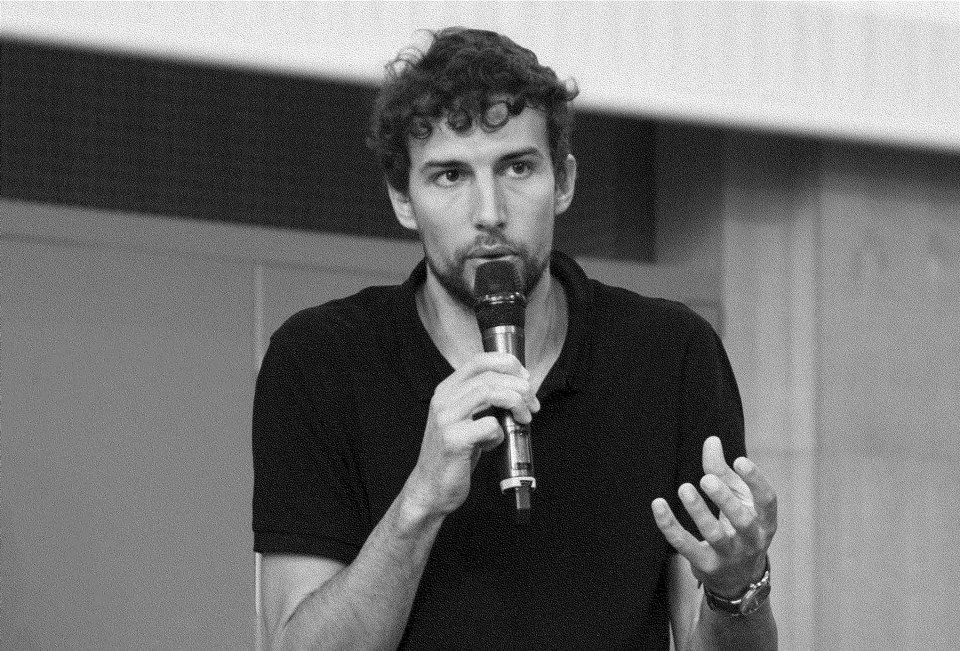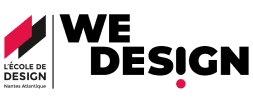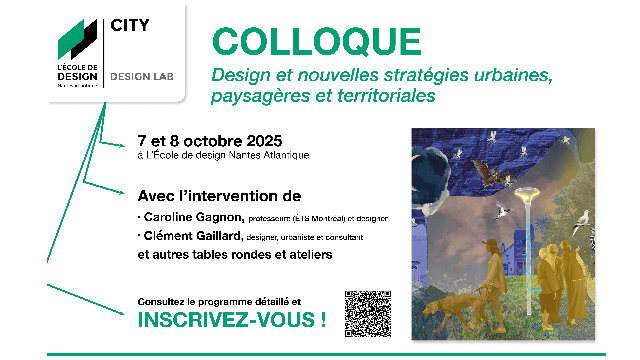City Design Conference "Design and new urban, landscape and territorial strategies"
The City Design Lab of L'École de design Nantes Atlantique invite you to participate to the :
Symposium "Design and New Urban, Landscape, and Territorial Strategies"
Featuring Caroline Gagnon, professor (ÉTS Montréal) and designer
and Clément Gaillard, designer, urban planner, and consultant.


What are the strategic roles of designers in the creation of regenerative cities and territories, in collaboration with local authorities, businesses, urban planners, architects, residents, etc.? How are and can designers become influencers for project owners, local authorities, project managers, designers, etc.?
These are all questions open to all stakeholders who create and transform our cities and territories.
The conference explores the strategic roles of urban, landscape, and territorial designers in society, particularly in the planning, design, and management of services, spaces, and objects, using an approach centered on residents, users, and living things. It aims to share and discuss methods, practices, and perspectives, to examine the designer's role in collaboration with other professionals and practitioners, and to open up fields of exploration for all stakeholders involved in the creation of cities and territories through design. It also offers a platform for dialogue between public, private and associative actors.
Whether you are a planner, a representative of a local authority, a designer, a student, a teacher, a researcher, a representative of an association, a citizen, or anyone else, you are warmly invited to share your experiences and participate in the lectures, roundtable discussions, and workshops that will be held during the conference.
To register for all or some of the sessions, free of charge :
- Tuesday, October 7, from 5:00 PM to 8:00 p.m. (Agora) :
Conferences and roundtables > Get inspired / Acculturate / Immerse yourself in the world:
Presentation of inspiring design practices and projects in new fields of design exploration, including territorial design, low-tech design, lighting design and nighttime lighting ambiances, etc.
Registration here
- Wednesday, October 8, from 9:00 AM to 12:30 p.m. (Prouvé Auditorium): Roundtables > Exchange / Discuss / Ask Questions:
Thematic discussions around the issues presented by project owners, developers, industry stakeholders, associations, etc.
Registration here
- Wednesday, October 8, from 2 p.m. to 6:30 p.m. (Room A3-16 Roger Tallon + Room A3-17 Zaha Hadid + Room A3-18 Verner Panton): Participatory workshops > exploring current practices and anticipating future areas and perspectives:
Reflections on the roles and functions of design in the creation of cities and territories (based on the themes: territories and habitats / economic zones and spaces / industrial sites)
Registration here
-------
The conference is part of the Interreg Europe / New European Bauhaus – PICOBELLO project, led by the Nantes Atlantique School of Design in partnership with Nantes Métropole, Samoa, and Nantes University. This European project encourages sustainable, inclusive, and aesthetic local approaches by linking the European Green Deal to lifestyles.
Through design, art, and science, PICOBELLO seeks to address complex social issues through collaborative actions. For the Nantes Atlantique School of Design, this project extends its vision of design as a tool for innovation serving society and ecological and social transitions.
The City Design Lab explores, through design, issues related to territories and cities: spatial, social, environmental, and economic transformation. It operates within the framework of planetary boundaries (climate, biodiversity, resources, energy) with a view to the public interest and social justice.
Its research and activities focus on housing, commerce, industry, interior design, public spaces, mobility, lighting, as well as the adaptation of places and services. They focus on regenerative cities, low-tech approaches, co-design, and territorial governance.
The Lab adopts a multi-scale (object → territory), plural (various actors), and transdisciplinary (design, human, technical, and natural sciences) approach, and covers all stages of urban development.
Documents1

